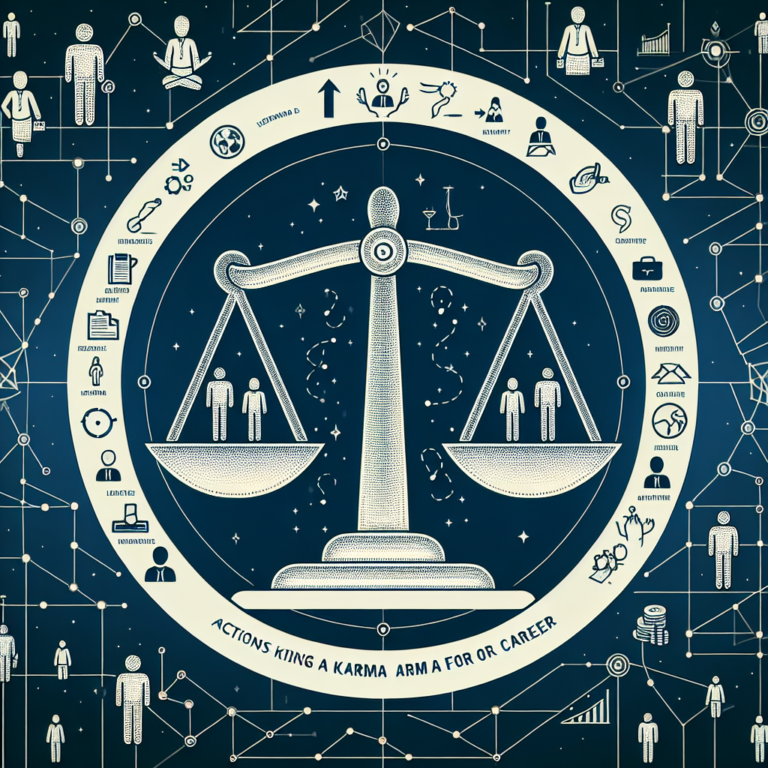The Law of Karma is often misunderstood; many consider it simply a form of retribution or justice. However, the concept encompasses a far more nuanced understanding of cause and effect. This comprehensive exploration will delve into what karma is, how it operates, its implications on our lives, and how we can cultivate a better understanding of our actions and their consequences.
What is Karma?
Karma is a term derived from the ancient Indian language of Sanskrit, meaning “action” or “deed.” In the context of Eastern philosophies, particularly Hinduism and Buddhism, karma refers to the principle of cause and effect where an individual’s actions influence their future experiences. This fundamental concept highlights the interconnectedness of all living beings and the impact of our choices, whether good or bad.
Historical Context of Karma
The roots of karma can be traced back over 2,500 years to the spiritual teachings of the Vedic texts in Hinduism. The concept evolved and was incorporated into various aspects of Buddhist philosophy as well. In both traditions, the law of karma serves as a moral compass, guiding individuals towards righteous living. It challenges us to consider the consequences of our actions on both ourselves and the world around us.
The Mechanics of Karma
At its core, the Law of Karma operates on the principle that every action has a consequence. When we engage in a thought, word, or deed, it creates an energy that ripples through the universe, shaping not just our present reality but also our future experiences.
Types of Karma
Karma is often categorized into different types:
- Sanchita Karma: This refers to the accumulated karma from all of our past actions, good and bad. It represents the totality of our deeds and their potential outcomes.
- Prarabdha Karma: This is the portion of karma that is currently active and is influencing our present circumstances. It is often thought of as the ‘cake of karma’ that we are currently experiencing.
- Aagami Karma: This refers to the karma we are currently creating through our thoughts and actions. It will influence our future experiences and outcomes.
The Role of Intent in Karma
Understanding karma is not merely about acknowledging that actions lead to consequences; it is equally about recognizing the intent behind those actions. In various spiritual traditions, the intention behind an action plays a crucial role in determining its karmic outcome.
Positive Vs. Negative Actions
Positive actions, driven by compassion, love, and altruism, tend to generate positive karma, resulting in favorable consequences. Conversely, negative actions rooted in hate, greed, and malice create negative karma, often leading to detrimental outcomes. This reinforces the idea that our choices are powerful and should be made with mindfulness.
Karma and Personal Responsibility
The Law of Karma teaches us about personal responsibility. We must recognize that we have the power to shape our reality through our actions and intentions. No matter our current situation, we can always choose to respond differently, creating a ripple effect that can change the course of our lives.
Examples of Karma in Everyday Life
To illustrate the concept of karma, consider the simple act of kindness. When you help someone in need, not only do you create a positive experience for them, but you also pave the way for positive outcomes in your own life. Whether it comes in the form of support during difficult times or unexpected opportunities, your benevolent actions can come back to you in ways you might not foresee.
On the flip side, consider the impact of malicious behavior, such as gossiping or hurting someone intentionally. Such actions can lead to the creation of a hostile environment, isolation, or even personal regret, manifesting the negative karmic cycle.
Karma in Relationships
The Law of Karma extends into our personal relationships, influencing how we connect with others. Our actions toward friends, family, and strangers setup a web of connections that impacts our social reality.
The Cycle of Engagement
In every interaction, we have the power to contribute positively or negatively to the relationship dynamic. A small act of kindness can strengthen bonds, while hurtful words can break them. Understanding the implications of our actions encourages us to be more mindful and intentional in how we engage with others.
Breaking the Cycle of Negative Karma
Many individuals may find themselves caught in a cycle of negative karma, where one detrimental action seems to lead to another. Recognizing this pattern is the first step towards breaking it.
Reforming Patterns through Awareness
To alter your karmic path, begin with awareness. Self-reflection can help illuminate patterns in your behavior that may be contributing to negative outcomes. By understanding your motivations, you can begin to shift your mindset and choose actions that lead to positive change.
The Importance of Forgiveness
Forgiveness—of ourselves and others—is a pivotal component in breaking the cycle of negative karma. By letting go of grievances and the need for retribution, we can release the energy tied to negative actions and create space for healing and transformation.
Spiritual Practices to Enhance Positive Karma
To cultivate positive karma, engaging in spiritual practices can be beneficial. These practices not only help create positive energy but also foster mindfulness and self-awareness.
- Mindfulness Meditation: This practice encourages present-moment awareness, allowing you to observe thoughts and feelings without judgment. Such awareness is crucial for making deliberate choices that generate positive karma.
- Acts of Service: Volunteering time or resources for those in need can create a wealth of positive karma. Service builds a sense of community and connection, reinforcing a cycle of kindness.
- Gratitude Practices: Regularly expressing gratitude can shift your perspective, allowing you to focus on the positive aspects of your life and, as a result, create more positive interactions.
Karma and the Law of Attraction
The Law of Karma often intersects with the Law of Attraction, which posits that like attracts like. Both concepts emphasize the importance of our thoughts and actions in shaping our reality. By fostering positive thoughts and engaging in constructive actions, we can attract a harmonious existence aligned with our desires.
The Importance of Alignment
For the Law of Attraction to work effectively, your thoughts, feelings, and actions must be in alignment. This means being conscious of what you think and how you behave. When you align positive thoughts with positive actions, you create a powerful energy that can transform your life.
Conclusion
The Law of Karma is a profound teaching that provides insight into the interconnectedness of all beings and the significant impact of our actions. Understanding the principle of cause and effect empowers individuals to take responsibility for their choices, promoting personal growth and harmonious relationships. By cultivating awareness, fostering positive actions, and embracing forgiveness, we can reshape our karma and ultimately create a more fulfilling life. Each action we take plays an essential role in our journey; by harnessing the power of karma, we can navigate life with intention and purpose.
FAQs
What is the origin of the term “karma”?
The term “karma” originates from the Sanskrit word meaning “action” or “deed,” and it is a significant concept in Indian religions, particularly Hinduism and Buddhism.
Does karma affect our future lives?
Many belief systems that embrace karma suggest that our actions influence not only our present lives but also future reincarnations, impacting our life circumstances in subsequent existences.
Can one change their karma?
Yes, one can change their karma through conscious choices and actions. By engaging in positive behavior and reflecting on past actions, individuals can create favorable karmic outcomes.
How does one cultivate positive karma?
Positive karma can be cultivated through intentional actions, including acts of kindness, mindfulness practices, and maintaining a positive mindset.
Is karma the same in different cultures?
While the core idea of karma as a principle of cause and effect is prevalent in many cultures, the specific interpretations and teachings can vary significantly among religions and philosophies.
It seems like you might want to ask for a specific type of prompt or perhaps a topic to discuss. Could you please clarify what kind of prompt you’re looking for? It could be related to writing, creative ideas, questions for discussion, or something else entirely!, #Law #Karma #Understanding #Effect #Lives, #Law #Karma #Understanding #Effect #Lives, 1735604712, the-law-of-karma-understanding-cause-and-effect-in-our-lives





